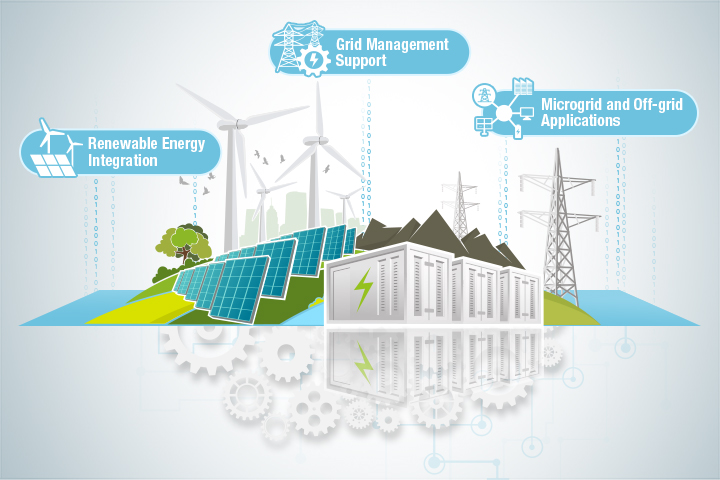Battery Energy Storage Solutions (BESSs) are increasingly vital in contemporary intelligent networks as the global shift towards energy progresses. Smart grids depend on them to maintain and stabilize their workloads. The aspirations of smart networks encompass improving network toughness and stability, fostering consistent power delivery in small networks and standalone systems, and accomplishing a harmonious integration of sustainable energy sources. The solution to these aims lies in robust information administration aptitudes, incorporating the seamless fusion of data circulation and power flow. By acquiring, supervising, assessing, and enhancing real-time data, we can assure the productive performance and dependability of power systems.
Integration of Sustainable Energy: Managing Intermitting Factors with Flexible Dispatch
The assimilation of sustainable energy hinges extensively on BESS because wind and solar energy outputs are inconsistent and prone to climatic conditions, day-to-night fluctuations, and seasonal alterations. During surpluses, BESS accumulates electricity and dispenses it during deficiencies, guaranteeing network steadiness. An excellent illustration of photovoltaic energy integration can be seen in California, which hosts a massive 3 GWh energy storage site. Owing to its significant solar energy production, California often encounters energy oversupply during peak daylight hours and deficits during nighttime or overcast days. By accumulating surplus solar energy and releasing it during peak usage periods, this facility averts solar wastage and efficiently smooths out energy usage oscillations. To achieve adaptable deployment, real-time tracking and analysis of energy flow are indispensable, along with optimizing the charging and discharging operations and ensuring efficient utilization of sustainable energy.
Support for Network Administration: Boosting Toughness and Dependability
Present-day networks confront a variety of difficulties, including demand fluctuations, equipment breakdowns, and natural catastrophes. With its swift-reacting backup capability, BESS supports in the prompt recovery of networks during crises, thereby enhancing network toughness. An illustration is Australia’s most extensive battery storage initiative, with a storage capacity of 1.68 GWh, designed to reinforce the resilience of the New South Wales network. In a matter of moments, this storage mechanism can react to network requirements and provide instantaneous backup power to address unforeseen equipment failures and demand oscillations. Furthermore, it harmonizes the fusion of new and conventional energy sources, optimizes the allocation of power assets, and reduces peak usage pressure. Information management is crucial to these procedures, enabling real-time supervision and evaluation of network and battery statuses, and furnishing precise operational recommendations and foresights. This guarantees the system functions effectively, enhancing network trustworthiness by sustaining a consistent power supply.
Applications for Microgrid and Off-grid Settings: Backing Localized Energy Supervision
In secluded zones and developing nations, electricity availability persists as a significant challenge. BESS offers long-term and adaptable solutions, running within microgrids or standalone systems, ensuring a steady power supply for these areas. By creating autonomous energy systems, BESS ensures a steadfast and effective power supply, propelling socio-economic advancement and bolstering energy independence. For example, the Bahariya Oasis microgrid BESS initiative in Egypt merges large-scale solar converters and energy storage mechanisms to institute a microgrid for local enterprises. Considering geographical limitations and inadequate infrastructure, local sustainable energy must serve as the chief energy source. This system chiefly utilizes solar power, lessening reliance on diesel generators. This delivers continuous dependable power supply while significantly decreasing environmental impacts. Through gathering and assessing comprehensive OT data, this project elevates energy management, anticipates maintenance demands, trims expenses, and extends equipment longevity.
Information Management: The Intellect Supporting BESS
Information management stands at the nucleus of BESS’s efficient performance. Through information collection, assessment, and supervision, BESS tracks energy flow, battery statuses, and system functioning in real time. Operators utilize this data to make precise determinations, such as determining the optimal moments for charging and discharging and predicting energy requirements. Furthermore, anticipatory maintenance through efficient information management boosts system maintainability, prolongs the equipment’s lifecycle, and diminishes failures, thereby reducing operating expenditures. As the Internet of Energy (IoE) and energy shift advance, information management will persist in playing a vital role in enhancing the efficiency and dependability of BESS operations—forming a robust foundation for the future of intelligent networks.
Explore further insights about Moxa’s Battery Energy Stockpile Solutions (BESS): https://www.moxa.com/bess
- Not Only for Automobiles: Discovering CANbus Technology in Various Industrial Settings - October 29, 2024
- Boost Your Network Performance: An Exciting Manual to PoE Switches! - September 10, 2024
- Understanding Gigabit Switches: Industrial vs Regular Gigabit - September 4, 2024


